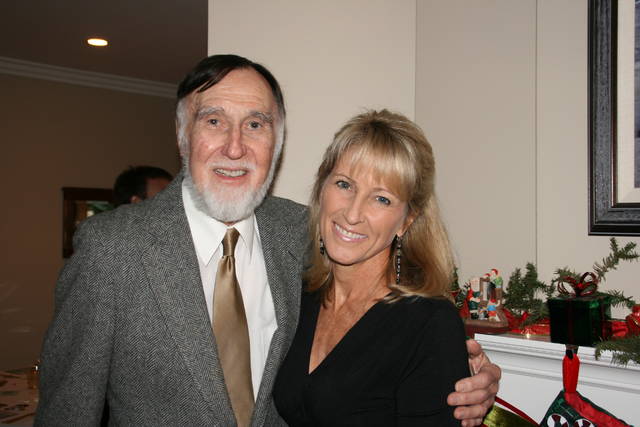Caring for loved ones suffering from dementia and Alzheimer’s is challenging, emotionally and physically.
“I was getting no sleep, it was very stressful on our marriage,” said Heather DeGeus, who was unsure how to care for her father after he began losing his memory and acting unusual.
The Alzheimer’s Association estimates that 66,000 people in Hawaii care for someone with dementia, including about 27,000 people with Alzheimer’s disease. Dementia caregivers provide 75 million hours of unpaid care, worth $944 million and many caregivers say they need help and support.
Caregivers can better understand and handle their challenging behaviors with workshops and training on Kauai, DeGeus said.
She moved her father to live with her after he began showing signs of dementia. She and her husband took care of him for about a month when they realized they needed help.
“He continued some of his bizarre behaviors, and it got progressively worse,” DeGeus said.
Her father, Dr. Albert “Ray” Harvey, a retired mathematics professor with a Ph.D. from Harvard in advanced calculus with complex variables, had also developed Sundowners Syndrome, a condition where seniors experience irritability, moodiness and anxiety during evening hours.
“He was fixated with the number seven,” DeGeus said. “He couldn’t sleep unless he got up at seven, went to bed at seven, had seven shrimp on his plate, just really bizarre behaviors like that.”
She sought help from the Kauai’s Alzheimer’s Society and Agency of Elderly Affairs, finding workshops and support groups that were helpful in understanding and dealing with the debilitating disease.
“I’m an only child, and there was no one else to share the responsibilities with,” DeGeus said. “I couldn’t do it. I needed help, I was a mess.”
The Alzheimer’s Society offers classes to help caregivers know how to handle certain behaviors. A free workshop will be offered on Saturday to help them along with a series of classes offered on Fridays starting Feb. 23 in Lihue.
“This training is the one opportunity on Kauai to learn the assembled knowledge of generations of caregivers, the findings of numerous research scientists and the experience of the Alzheimer’s Association on how to make caregiving a more reasonable and balanced experience,” said Humberto Blanco, Kauai program specialist for the Alzheimer’s Association Aloha Chapter.
“For many participants, being a caregiver will be one of the most difficult things they will ever undertake in their lives,” he said. “This is the opportunity for caregivers to equip themselves with the facts, mindset and recommended procedures they will need to maintain their equilibrium and quality of life while performing this service for their family.”
Certified trainer and mentor Dorothy Colby will conduct the Positive Approach to Dementia Care workshop on Saturday. Colby said her workshop helps caregivers understand what’s behind challenging behaviors and teaches techniques to better connect with people with dementia. AARP Hawaii and the Hawaii Alzheimer’s Disease Initiative are sponsoring the seminar at the Kauai Community College Fine Dining Center from 9 a.m. to noon.
The caregiver class highlights signs and symptoms of early Alzheimer’s, as well as the physiology of what’s going on in the brain and how synapses don’t properly connect.
“It was very enlightening for my husband and myself,” DeGeus said. “Their writing deteriorates. They get so they can’t write, and I didn’t know that was one of the symptoms…. Another example was my father was seeing double.”
The workshop not only shares how to cope with their unusual behaviors, it also helps caregivers figure out medications and how to manage finances.
“You need to get your ducks in a row financially,” DeGeus said. “Do you have a trust? Do you have a will? Is there a health care director? Have you found the deed to their house? Do you have a list of all the accounts? Do you have the authority to handle the money for them? All of the things you don’t think about.”
DeGeus’ father succumbed to the debilitating illness at the age of 92. It typically takes about 12 to 15 years from early onset to death.
“He really needed help. He would need to be reminded to get dressed,” she said. “He needed high directions, and he was still wandering at night and pounding on doors.”
“We learned so many valuable lessons from that class,” DeGeus said.
The Alzheimer’s Association and Kauai County Agency on Elderly Affairs are also offering free Family Caregiver Training on Fridays from to 3:30 p.m. Feb. 23 through May 18 (except for the March 30, Good Friday). Three additional training classes will be held on Fridays from May 25 through June 8. The classes are at the Piikoi Building, conference room Piikoi B at 4444 Rice Street, Suite 330.
“I highly, highly recommend it to caregivers, either family members or professionals,” DeGeus said.
To register for the Saturday AARP workshop, call (877) 926-8300 or go to aarp.cvent.com/positive2-24.
Register for the Alzheimer’s Association Family Caregiver Training by calling 245-3200, ext. 8242 or email hblanco@alz.org.
“It’s just a really hard and stressful thing to have a loved one with Alzheimer’s,” DeGeus added. “It was the hardest thing I’ve ever had to deal with.”



Aluminum in cooking pots, deodorants, chlorine in drinking water and fluoride in toothpaste all causes Alzheimer’s disease in humans. Chlorine was used in Nazi prison camp to keep prisoners docile and submissive.
There are alternatives to these toxic compounds which should be used instead.